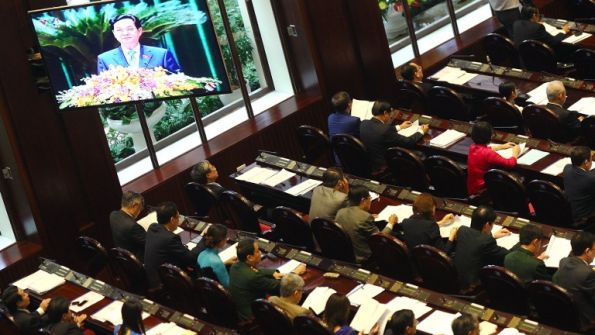'It is clear, however, that Vietnam’s 90m people won't be consulted on the Party’s next choice of prime minister, or for that matter, anything else; the government still does not allow free elections. Party congresses are effectively closed to the media, and following Hanoi politics is perhaps a bit like watching a football match through the wrong spectacles: The pitch and the general outlines of the action are clear enough, but not the footwork or the tackles.'
SOME Western advocacy groups imply, in their regular
harangues of Vietnam's human-rights record, that the country is run by an
all-powerful and well-oiled authoritarian regime. The truth, however, appears
to be more complicated.
It is clear to analysts that the Ministry of Public Security
operates a vast surveillance apparatus designed to silence political
dissident—even on Facebook—and that Prime Minister Nguyen Tan Dung has major
influence over key policy decisions. To wit: his emergency directives earlier
this month helped to evacuate successfully nearly 800,000 people from coastal
areas ahead of Typhoon Haiyan. Relief agencies praised his efficiency and
foresight.
Yet the government is also, like a schoolyard, full of turf
wars. Some provincial officials chafe at central directives, for example, while
ministries openly undercut each other. And inside the ruling Communist Party,
Mr Dung is said to be embroiled in a tug-of-war with a rival party faction led
by Truong Tan Sang, the president, and Nguyen Phu Trong, the party's general
secretary. Adam Fforde, a Vietnam specialist at Victoria University in
Australia, wonders aloud if the country is a "land without a king."
However, the state-controlled press occasionally tosses out
crumbs of information that indicate which politicians are advancing, or vice
versa, through Hanoi’s opaque bureaucracies and vast patronage networks. A case
in point was the appointment by the National Assembly, on November 13th, of two
new deputy prime ministers. With the apparent blessing of Mr Dung and the
Communist Party’s elite Politburo, the assembly chose Vu Duc Dam, a former
assistant to a previous prime minister, and Pham Binh Minh, the current
minister of foreign affairs. A current DPM, Nguyen Thien Nhan, has been
dismissed and moved to the comparatively unglamorous position of heading the
Homeland, or Fatherland, Front, an organisation tasked with mobilising support
for the regime and selecting National Assembly candidates.
Seasoned observers say the reshuffle suggests a few
interesting things about Vietnamese politics. The main takeaway is that Mr Dung
appears to be reasserting his influence after rebounding from months of heavy
internal criticism. A year ago he was forced by his rivals to publicly
apologize for mismanaging the economy, but he is now filling his cabinet with
loyal and highly competent allies. He may have his eye on 2016, when he will
step down as prime minister but could remain in the Politburo. Although not all
DPMs are Politburo members, the general view is that it certainly wouldn’t hurt
Mr Dung to have some of his closest associates in top government positions.
Neither Mr Dam or Mr Minh are in the running for the
premiership in 2016, in analysts’ view, and Mr Minh never will be because he is
a career diplomat who doesn't have a wide-enough political base. But Mr Dam,
who was until recently chairman of the government office—the rough equivalent
to an American president's chief of staff—could eventually become a candidate
for both the top job and a seat on the 16-member Politburo. Tuong Vu at the
University of Oregon, in America, says the politician with a better chance of
becoming prime minister in 2016 is the current first DPM, Nguyen Xuan Phuc, who
is already a Politburo member.
However, Mr Minh has retained his position as head of the
foreign ministry, and his DPM election could help allay lingering concerns
among top Vietnamese officials that the country can't pursue an effective
foreign policy if its foreign ministry lacks pull in the Politburo. Mr Minh,
who has a graduate degree in law and diplomacy from Tufts University, in
America, and has served as a diplomat in both New York and Washington, is not
yet a candidate for the Politburo, and he may never be. But Professor Vu said
last week that Mr Minh’s DPM appointment would be a “compromise solution”
designed to raise the ministry’s profile.
It is difficult to predict whether or to what extent Mr
Minh's new title will have any direct bearing on Vietnam's human-rights record
or its negotiations on the Trans-Pacific Partnership, an American-led
free-trade agreement involving a dozen countries. (America’s treasury
secretary, Jacob J. Lew, visited Hanoi on November 14 to help drum up support
for it.) Equally unknown is who will get the premier nod in 2016. Analysts say
it probably won’t be Nguyen Thien Nhan, the recently departed DPM. Some see Mr
Nhan’s dismissal as both a sidelining and a reflection on his allegedly poor
performance as education minister.
It is clear, however, that Vietnam’s 90m people won't be
consulted on the Party’s next choice of prime minister, or for that matter,
anything else; the government still does not allow free elections. Party
congresses are effectively closed to the media, and following Hanoi politics is
perhaps a bit like watching a football match through the wrong spectacles: The
pitch and the general outlines of the action are clear enough, but not the
footwork or the tackles.
(Photo credit: AFP)


No comments:
Post a Comment